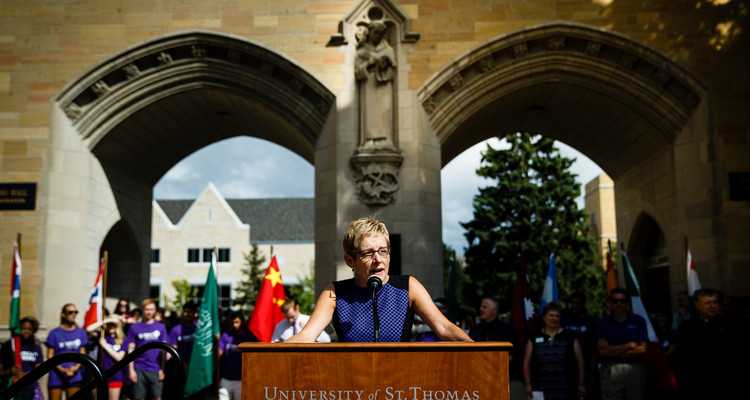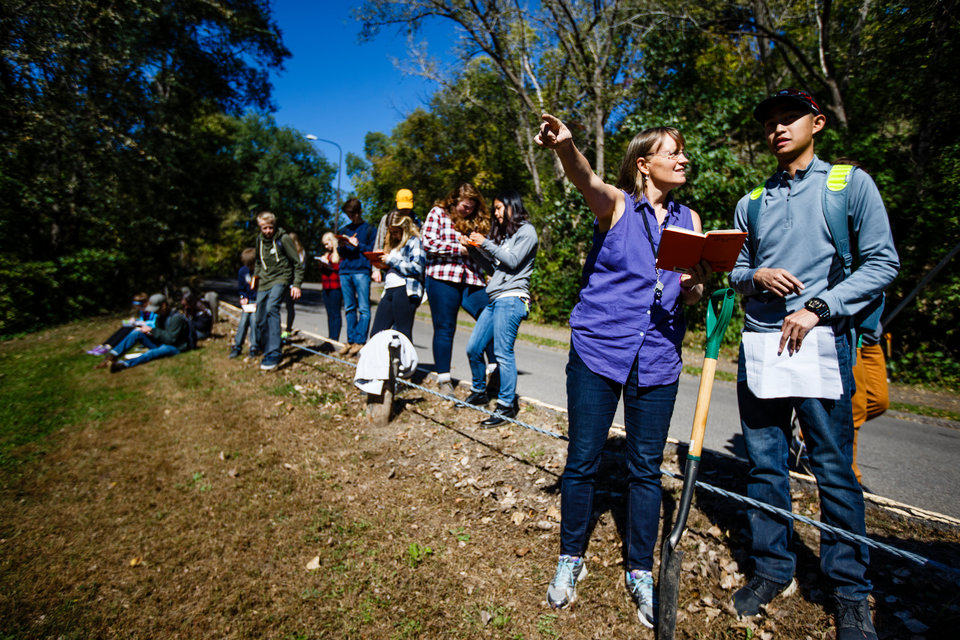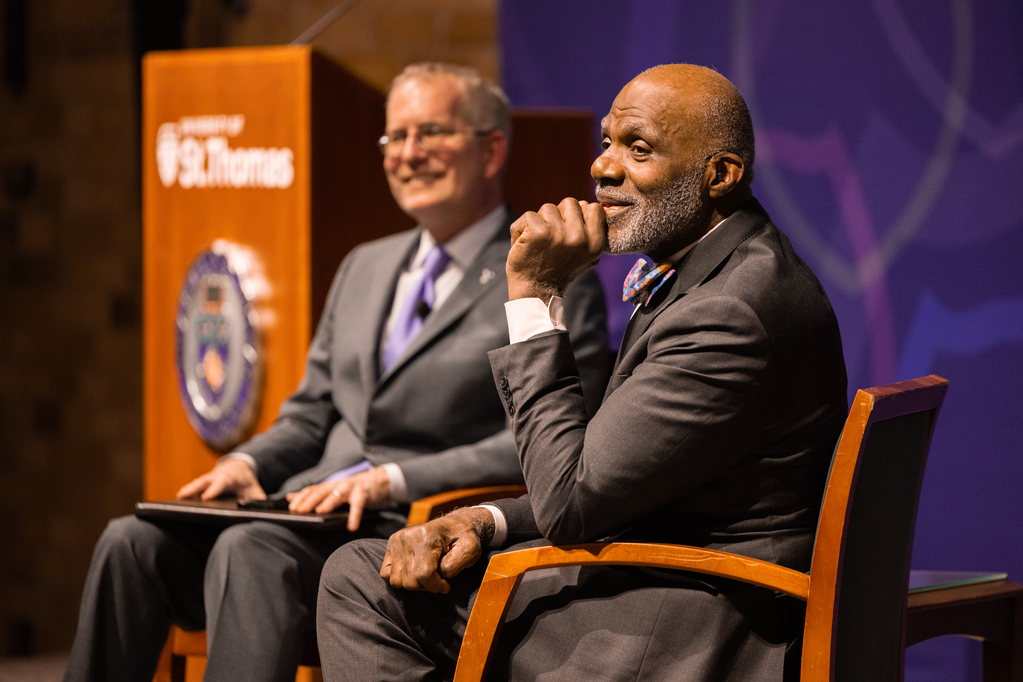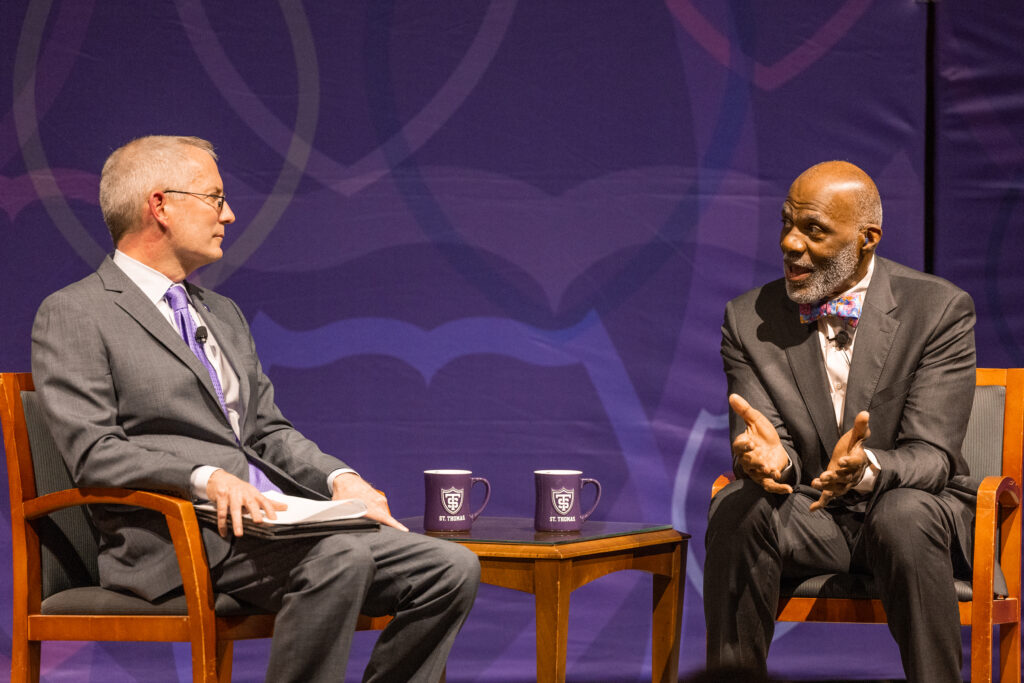When I was chosen president of St. Thomas three years ago, I shared how attracted I was to the university’s compelling mission statement and its emphasis on educating students “to be morally responsible leaders who think critically, act wisely and work skillfully to advance the common good.”
That spring, when I conducted a planning survey of faculty, staff and students, a collective sentiment emerged on how much the mission statement resonated with them. They, too, embraced it and said it inspired them.
As I have met thousands of alumni in our 100,000+ Tommie Network, two things consistently have amazed me. First, they reflect a commitment, in whatever they do, to make things better. Second, they frequently and consistently share how St. Thomas played an important role in transforming their lives and shaping who they are today, which inevitably is morally responsible leaders who advance the common good.
Two years ago, as our community began work on a new strategic plan, the mission statement never was far from mind. It became fundamental to our five strategic themes and our eight strategic priorities, and now its key words – “to advance the common good” – are the crux of a new branding effort to describe your University of St. Thomas. We are:
“All for the Common Good.”
We are for the common good in our classrooms and laboratories. In our scholarship and research. In our community service. And in the work of alumni in businesses, schools, government agencies and nonprofit organizations.
People ask me what it means to provide a “common good education,” especially at a time when employers require thorough training in a discipline, expertise in technology and strong communication skills. How germane is a common good education in our efforts to prepare students for careers and for roles as community leaders?
It not only is very germane, but it also is an essential piece of our identity – first articulated by founder Archbishop John Ireland and then nurtured over 131 years by generations of leaders who left us a legacy which is our privilege to maintain and enhance.
What does "common good" really mean?
The concept of the common good, while long a tenet of our faith, has had a bright spotlight in the three years that Pope Francis has led the Catholic Church. His words and actions symbolize the common good – a concept that rejects individualism and focuses on the interdependence of humanity and our planet.
In the Catholic tradition, the classic definition of the common good is a set of conditions that allows each and every member of a community to flourish. This, in turn, depends on an understanding of the nature and dignity of the person, and in the Catholic view each person is an image of God with the capacity to reason, choose freely, love and live in community.
Thus, a “common good education” seeks to cultivate respect, understanding and empathy for others. Such an education also seeks to equip students to understand and appreciate the common good of society and to encourage a lifelong commitment to protect and enhance the common good at every opportunity.
In my view, our community and our Tommie Network has that understanding, that appreciation and, perhaps most importantly, that commitment.
St. Thomas brand statement
At the University of St. Thomas, we believe in hard work, human dignity and the transformative power of purple. We stand up for faith, hope and the power of individuals, working together, to achieve uncommon feats. We build bridges, create solutions and power ideas that move the world forward. And every day, we commit ourselves to being agents of change: to thinking critically, acting wisely and working skillfully, all for the common good.
This is evident in the strategic plan work of our Educating for the Future Task Force, which states that in light of our mission statement we must provide an education that allows people to:
- Think critically (integrated knowledge) by reasoning and critical thinking, integration and interdisciplinarity, and curiosity and creativity.
- Act wisely (ethical values) through an ethical and moral compass, meaningful engagement, and global and diverse perspectives.
- Work skillfully (broad and deep skills) as a result of content knowledge, communication, preparation, adaptability and leadership.
Each of those elements is a necessary skill and competency for the pursuit of the common good.
A brand strategy
Another strategic plan task force, on Enhanced Visibility and Profile, embraces the same themes in its work to develop a new brand strategy that will help to increase public awareness, enhance our reputation, recruit students and raise funds.
As successful as efforts have been in our evolution into a comprehensive university, we also have seen too much fragmentation and inconsistency in our communications and our visual identity. We knew that we needed to do a better job answering the fundamental question asked by every constituent:
Why St. Thomas?
We established a 21-person task force representing every stakeholder group to guide a process to understand perceptions and develop a brand strategy. We retained two agencies: Barrie D’Rozario DiLorenzo of Minneapolis conducted market research and Mindpower of Atlanta conducted additional research and developed a strategy after holding focus groups with 500 people.
Mindpower affirmed that our community “is thoroughly connected and committed” to our mission. To determine how to compellingly express our brand, we compared our existing messages and visual identity with those of our competitors and found too much commonality. Mindpower concluded that to “break out,” we cannot emulate. “Be bold. Clear. Loud. Consistent. And unmistakably you.”
Out of that examination emerged “All for the Common Good,” a brand strategy in our publications, including this magazine, on our websites, in newspaper and magazine advertising, and on electronic billboards throughout the Twin Cities area. The response on campus and among our stakeholders has been enthusiastic and contagious.
We believe this brand strategy is relevant and flexible enough to work for undergraduate and graduate – as well as liberal arts and professional – programs and powerful enough to unite us. The bold move we are making is for ALL to come together as ONE. And what we agree on, feel within our hearts and resonates in our minds, bodies and spirits is our mission.
We are “All for the Common Good.”
Read more from St. Thomas magazine.







